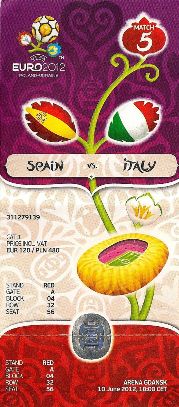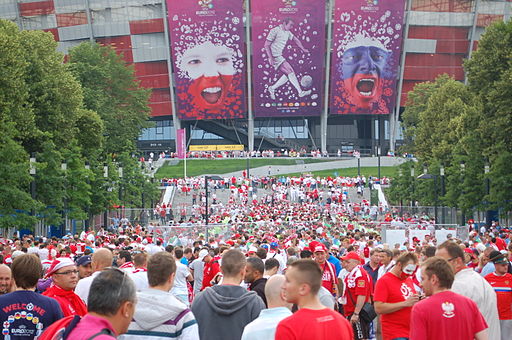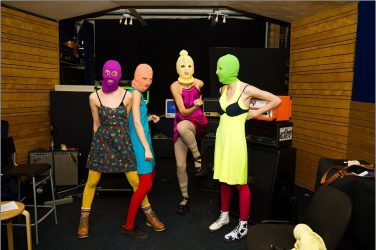The Polish-Ukrainian bid in 2005 to host this year’s European Football Championship was a symbolic and political act. After all that has changed since then, was hosting the Euro a successful move for both countries or a boomerang that came back quicker than expected?
Players, coaches and fans may wish that all politics be left outside the stadium during a major international sporting competition such as the European Football Championship. However, this is never the case, and this year’s Euro in particular has been heavily politicised: in fact Poland co-hosting with its eastern, non-EU neighbour Ukraine is in itself a political act. Poland could have turned down the Ukrainians when they first proposed the idea in 2003 and chosen instead to make a bid to co-host with any of its “more developed” western neighbours. However, the government ultimately decided to take a risk and join Ukraine in going up against the likes of Italy to host the 2012 tournament. Was this a successful move for both countries or a boomerang that came back quicker than expected?
Together on the road to Europe?
Poland has made no secret of its desire to pull Ukraine out of the Russian sphere of influence and set it on a stable course for EU partnership – and perhaps even eventual membership. Likewise, back in 2005 when the decision was originally made to submit a joint bid to co-host the tournament, Ukraine was pursuing a policy of economic and political modernisation, an attempt to escape its Soviet past and become a fully-fledged member of “the West.”

What better way for each country to accomplish their respective goals than to co-organise a major pan-European football tournament? A tournament that would be closely watched by all Europeans, that could bring thousands people from Germany, France, Italy and Britain to these “strange eastern lands” to see their progress with their own eyes and say “Yes! This is a beautiful country, everything is so well-organised, this certainly is Europe!” In 2007, when UEFA awarded the Euro to Poland and Ukraine, both nations definitely had reasons to be optimistic.
That, however, is more than five years ago. Since then Ukraine has seen dramatic political changes: the progressive, pro-EU leader of the Orange Revolution, Victor Yushchenko, is no longer president of the country; his Orange Revolution ally and former prime minister Yulia Tymoshenko is serving a prison sentence for what can only be described as political reasons; Ukraine’s current president, Victor Yanukovych, appears to be directing Ukraine back into Russia’s orbit in a complete reversal of the earlier pro-Europe policies which led to Ukraine submitting the joint bid with Poland in the first place. Western governments reacted to these changes: most recently, in response to allegations of human rights abuses in connection with the Tymoshenko case, Germany’s government has led a significant number of European political leaders in boycotting all matches held in Ukraine. What Victor Yushchenko and his Polish counterparts originally envisioned as the beginning of Ukraine’s road to Europe via sport has become marred by political scandal. Was the “western reaction” a move to stand up for human rights and the people in Ukraine or an opportunistic display of outrage directed at domestic audiences? Did European politicians make a mistake by mixing sport with politics and obscuring Ukraine’s chance to shine? For a nation that five years ago was so eagerly knocking on Europe’s front door, such negative responses to its co-hosting of the tournament are a bad sign – shouldn’t Ukraine’s accomplishments be highlighted as much as the scandal currently gripping the country?
In Poland things are a bit different, however. As a committed member of the EU, Poland is now undoubtedly a part of the much revered “West” – although Poles still sometimes suffer from a post-communist identity crisis and look for something to confirm their status as a European nation, especially in the eyes of big European countries such as Germany, Britain and France. The Euro seemed to be a perfect opportunity to find such confirmation.
“The BBC Panorama program took snapshots of the situation in Polish stadiums and presented them as an everyday situation in Poland.”
For Mateusz, a student from Warsaw,”Poland is still a country that attracts relatively few tourists (not only compared to Western European states, but also its neighbour Czech Republic) and thus the problem is not necessarily that Poland has a bad image abroad, but rather that it is completely unknown. Euro 2012 is a chance to change that and introduce Poland into the Western consciousness.”

This is why negative media coverage of the tournament hurts Poles almost as much as it hurts Ukrainians. Much like in Ukraine, “western” media latched onto negative stories involving the politics surrounding the tournament rather than covering the significant strides made in organising it. This started with the BBC’s sensationalist Panorama documentary, airing just a couple of weeks before the start of the tournament, which highlighted anti-Semitism and racism in Polish and Ukrainian stadiums during league matches – a representation of the countries that seems unfair to many. In the eyes of Mateusz, “the BBC Panorama was a shockingly biased report for a programme that prides itself on its quality and in-depth analysis. It took snapshots of the situation in Polish stadiums and presented them as an everyday situation in Poland… I am afraid that the programme achieved its goal and scared off many potential visitors from coming.” Weeks later, the most heavily reported story from Poland was about the violent clashes between the radical segment of Polish and Russian football fans on the day of the match between the two teams in Warsaw. The incident saw more press coverage than the tens of thousands of anti-Putin protesters in Moscow the very same day. And the media was also quick to point out recent hostilities in Polish-Russian relations and to politicise an affair that could have also been represented as clashes between extreme nationalistic groups that don’t stand for either of the countries.
Flower buds and european identity
These types of media reports and political actions can be detrimental to Poland and Ukraine’s campaign to re-define their national identities, which, on a symbolic level, is really what co-hosting this year’s Euro is all about. Take for example the official motto Poland and Ukraine have chosen for the tournament: “Creating History Together” which in the original Polish (Razem tworzymy przyszłość) literally means “together we are creating the future”. This slogan can be interpreted in multiple ways.
It could be read as related solely to sport: the fans, the players, the managers are all working together for the future of their national football team. Or, what is perhaps more likely: Poland and Ukraine, as two post-communist European states, are breaking with their Soviet-dominated past and striving for a progressive European future by hosting this pan-European tournament together. A third, slightly more fanciful interpretation for the true idealists: visiting fans take part in a sporting event that brings a wide variety of Europeans together in one place, while at the same time introducing them to the local culture of the host countries and perhaps opening their eyes to what Poland and Ukraine have to offer to the rest of Europe.
The EURO 2012 is a “unique chance to present the unparalleled Slavic hospitality and culture to millions of sports fans across the whole world.”
Or perhaps it can be interpreted in all three ways? Take another example: the official logo of the tournament – that flower with a football in place of the bud which so many football fans across Europe are now familiar with. The flower is a stylised form of Polish/Ukrainian folk art called wycinanka. According to tournament organisers, the wycinanka represents “worship of the land and true respect for continuous growth, prosperity and fertility:” three ideals which are crucial to post-communist Poland and Ukraine. In short, the Euro was supposed to bring modernisation through capital and foreigners who are quite possibly seeing Poland or Ukraine for the first time – and we all know how important first impressions are. It seems Poland and Ukraine have tried to send a positive message to the rest of Europe.

And while a significant portion of the media and the politicians have refused to listen or recognise this message, Europe’s top football teams and fans appear to have taken notice. Rather than being sent home in “body bags” as England’s Sol Campbell was quoted in BBC’s Panorama documentary, foreign visitors have been expressing very positive opinions of their experiences in Poland and Ukraine. According to a recent survey conducted by PBS, “81 percent of foreign fans in Poland for Euro 2012 will visit the country again, while 92 percent declared they will recommend Poland as a destination to their friends.” The most vocal fans about this have been the Irish, who have created an 18 page long “thank you Poland” post on their fan forums praising Poland for how welcome they felt in the country. This may well be the result of one of the unofficial themes of this year’s Euro, “warm Slavic hospitality,” which was already announced by Victor Yushchenko when the Euro was awarded to Poland and Ukraine. He declared that this was a “unique chance to present the unparalleled Slavic hospitality and culture to millions of sports fans across the whole world.” Apart from politicians, this type of positive feedback will surely come as welcome news to young Poles, who crave exposure to foreign visitors as a means of re-affirming their European identity. It remains to be seen whether the same can be said of Ukraine, which is experiencing a much more intense identity crisis. But similar experiences from foreigners could have an equally positive effect on the younger generation in Ukraine – something that might be needed.
All in all, it seems that media representations and political statements diverge from what fans, tourists, Poles and Ukrainians often experienced – this may be something to think about not only in the context of the Euro. In the end, however, hosting the tournament might have been a successful move. And from the perspective of a “Polish new age idealist,” it might even be a good lesson for the future: in this age of crises and European divisiveness, maybe all Europe really needs is a good dose of Slavic hospitality?
Teaser Image: Graeme Maclean (CC-BY-2.0)






